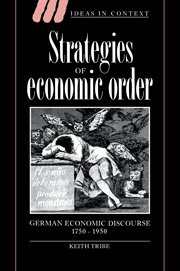Book contents
- Frontmatter
- Contents
- Acknowledgements
- 1 Introduction: From Cameralism to Ordoliberalism
- 2 Cameralism and the science of government
- 3 Die Vernunft des List. National economy and the critique of cosmopolitan economy
- 4 Historical Economics, the Methodenstreit, and the economics of Max Weber
- 5 The Handelshochschulen and the formation of Betriebswirtschaftslehre, 1898–1925
- 6 The Logical Structure of the Economic World – the rationalist economics of Otto Neurath
- 7 Capitalism, totalitarianism and the legal order of National Socialism
- 8 The genealogy of the Social Market Economy: 1937–48
- 9 The New Economic Order and European economic integration
- Bibliography
- Index
- Ideas in Context
8 - The genealogy of the Social Market Economy: 1937–48
Published online by Cambridge University Press: 14 September 2009
- Frontmatter
- Contents
- Acknowledgements
- 1 Introduction: From Cameralism to Ordoliberalism
- 2 Cameralism and the science of government
- 3 Die Vernunft des List. National economy and the critique of cosmopolitan economy
- 4 Historical Economics, the Methodenstreit, and the economics of Max Weber
- 5 The Handelshochschulen and the formation of Betriebswirtschaftslehre, 1898–1925
- 6 The Logical Structure of the Economic World – the rationalist economics of Otto Neurath
- 7 Capitalism, totalitarianism and the legal order of National Socialism
- 8 The genealogy of the Social Market Economy: 1937–48
- 9 The New Economic Order and European economic integration
- Bibliography
- Index
- Ideas in Context
Summary
If we are to judge the potentialities aright it is necessary to realize that the system under which we live choked up with attempts at partial planning and restrictionism is almost as far from any system of capitalism which could be rationally advocated as it is different from any consistent system of planning. It is important to realize in any investigation of the possibilities of planning that it is a fallacy to suppose capitalism as it exists today is the alternative. We are certainly as far from capitalism in its pure form as we are from any system of central planning. The world of to-day is just interventionist chaos.
Today, the phrase ‘Social Market Economy’ is widely understood as a codeword for a prudent economic centrism. Its terminological predecessor, the ‘mixed economy’, now conveys the sense of an uneasy relationship between state and economy, in which corporatism and big government determine the balance between private and state enterprise. The Social Market Economy is more overtly capitalistic than this – a capitalism with an acceptable, human face in which greater emphasis is placed upon legal regulation as the means of identifying and achieving social objectives. Stated in this way, we have already lent the term a somewhat clearer profile than it usually assumes in the everyday discourse of journalists and politicians.
- Type
- Chapter
- Information
- Strategies of Economic OrderGerman Economic Discourse, 1750–1950, pp. 203 - 240Publisher: Cambridge University PressPrint publication year: 1995
- 1
- Cited by

